成考英语试卷讲课教案
- 格式:docx
- 大小:25.94 KB
- 文档页数:5
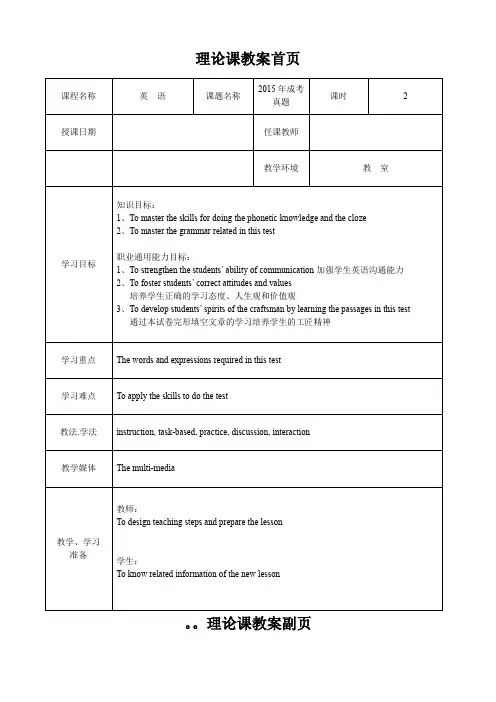
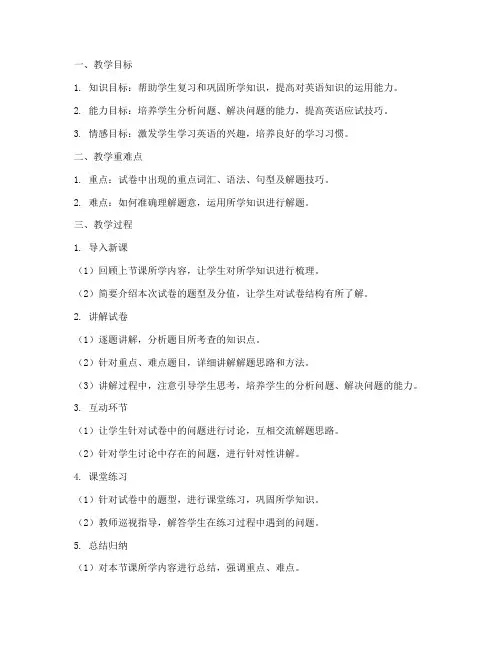
一、教学目标1. 知识目标:帮助学生复习和巩固所学知识,提高对英语知识的运用能力。
2. 能力目标:培养学生分析问题、解决问题的能力,提高英语应试技巧。
3. 情感目标:激发学生学习英语的兴趣,培养良好的学习习惯。
二、教学重难点1. 重点:试卷中出现的重点词汇、语法、句型及解题技巧。
2. 难点:如何准确理解题意,运用所学知识进行解题。
三、教学过程1. 导入新课(1)回顾上节课所学内容,让学生对所学知识进行梳理。
(2)简要介绍本次试卷的题型及分值,让学生对试卷结构有所了解。
2. 讲解试卷(1)逐题讲解,分析题目所考查的知识点。
(2)针对重点、难点题目,详细讲解解题思路和方法。
(3)讲解过程中,注意引导学生思考,培养学生的分析问题、解决问题的能力。
3. 互动环节(1)让学生针对试卷中的问题进行讨论,互相交流解题思路。
(2)针对学生讨论中存在的问题,进行针对性讲解。
4. 课堂练习(1)针对试卷中的题型,进行课堂练习,巩固所学知识。
(2)教师巡视指导,解答学生在练习过程中遇到的问题。
5. 总结归纳(1)对本节课所学内容进行总结,强调重点、难点。
(2)布置课后作业,巩固所学知识。
四、教学评价1. 课堂表现:观察学生在课堂上的参与度、回答问题的情况。
2. 课后作业:检查学生课后作业的完成情况,了解学生对所学知识的掌握程度。
五、教学反思1. 教学过程中,关注学生的学习需求,及时调整教学策略。
2. 注重培养学生的英语思维,提高学生的英语应试能力。
3. 课后及时反思,总结教学经验,不断提高教学质量。
以下为一份具体的教案示例:教案示例一、教学目标1. 知识目标:掌握试卷中出现的关键词汇、语法、句型。
2. 能力目标:提高英语阅读理解能力,培养解题技巧。
3. 情感目标:激发学生学习英语的兴趣,提高学习效率。
二、教学重难点1. 重点:词汇、语法、句型的运用。
2. 难点:阅读理解中的长难句、推理判断题。
三、教学过程1. 导入新课(1)回顾上节课所学内容,让学生对所学知识进行梳理。
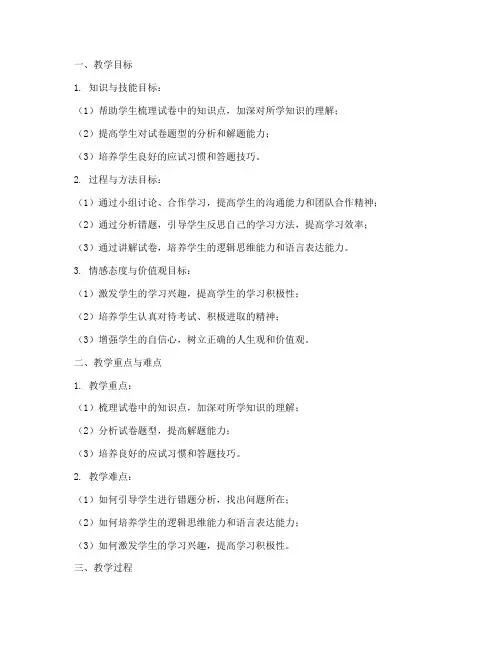
一、教学目标1. 知识与技能目标:(1)帮助学生梳理试卷中的知识点,加深对所学知识的理解;(2)提高学生对试卷题型的分析和解题能力;(3)培养学生良好的应试习惯和答题技巧。
2. 过程与方法目标:(1)通过小组讨论、合作学习,提高学生的沟通能力和团队合作精神;(2)通过分析错题,引导学生反思自己的学习方法,提高学习效率;(3)通过讲解试卷,培养学生的逻辑思维能力和语言表达能力。
3. 情感态度与价值观目标:(1)激发学生的学习兴趣,提高学生的学习积极性;(2)培养学生认真对待考试、积极进取的精神;(3)增强学生的自信心,树立正确的人生观和价值观。
二、教学重点与难点1. 教学重点:(1)梳理试卷中的知识点,加深对所学知识的理解;(2)分析试卷题型,提高解题能力;(3)培养良好的应试习惯和答题技巧。
2. 教学难点:(1)如何引导学生进行错题分析,找出问题所在;(2)如何培养学生的逻辑思维能力和语言表达能力;(3)如何激发学生的学习兴趣,提高学习积极性。
三、教学过程1. 导入新课(1)回顾上节课所学内容,引导学生进入英语学习状态;(2)介绍本次试卷的题型、分值及考试范围。
2. 试卷讲评(1)分组讨论,分析试卷中的错题,找出问题所在;(2)小组代表分享讨论成果,教师点评、讲解;(3)针对错题,引导学生反思自己的学习方法,提出改进措施;(4)讲解试卷中的难点题目,分析解题思路,总结答题技巧。
3. 拓展延伸(1)布置课后作业,巩固所学知识;(2)分享学习心得,提高学生的学习兴趣。
4. 总结与反思(1)回顾本节课所学内容,总结重点、难点;(2)引导学生反思自己的学习过程,提出改进措施;(3)教师点评、总结,提出对学生学习的期望。
四、教学评价1. 课堂参与度:观察学生在课堂上的发言、讨论情况,评价学生的参与积极性。
2. 知识掌握情况:通过课后作业、课堂提问等方式,评价学生对所学知识的掌握程度。
3. 学习态度:观察学生的学习态度,评价学生的学习积极性、进取心。
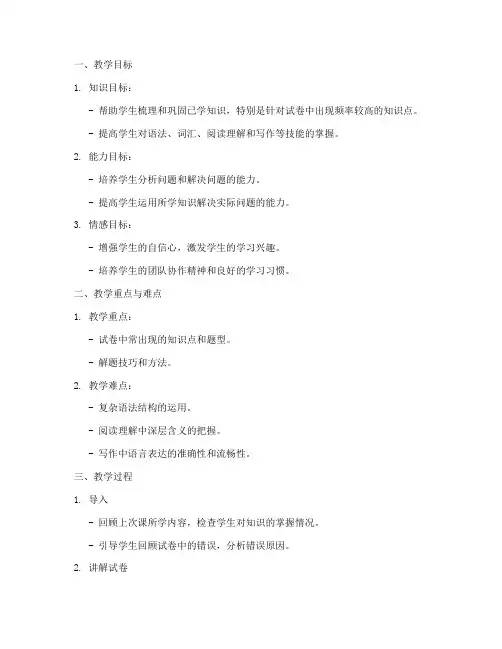
一、教学目标1. 知识目标:- 帮助学生梳理和巩固已学知识,特别是针对试卷中出现频率较高的知识点。
- 提高学生对语法、词汇、阅读理解和写作等技能的掌握。
2. 能力目标:- 培养学生分析问题和解决问题的能力。
- 提高学生运用所学知识解决实际问题的能力。
3. 情感目标:- 增强学生的自信心,激发学生的学习兴趣。
- 培养学生的团队协作精神和良好的学习习惯。
二、教学重点与难点1. 教学重点:- 试卷中常出现的知识点和题型。
- 解题技巧和方法。
2. 教学难点:- 复杂语法结构的运用。
- 阅读理解中深层含义的把握。
- 写作中语言表达的准确性和流畅性。
三、教学过程1. 导入- 回顾上次课所学内容,检查学生对知识的掌握情况。
- 引导学生回顾试卷中的错误,分析错误原因。
2. 讲解试卷- 听力部分:- 分析错题,讲解听力技巧,如如何捕捉关键词、如何判断语境等。
- 播放听力材料,让学生进行跟读和练习。
- 阅读理解部分:- 分析错题,讲解阅读技巧,如如何快速浏览、如何抓住文章主旨等。
- 分组讨论,让学生互相交流阅读理解心得。
- 完形填空部分:- 分析错题,讲解完形填空解题技巧,如如何根据上下文推测词义、如何排除干扰项等。
- 学生独立完成练习,教师巡视指导。
- 语法填空部分:- 分析错题,讲解语法知识点,如时态、语态、非谓语动词等。
- 学生独立完成练习,教师巡视指导。
- 写作部分:- 分析错题,讲解写作技巧,如如何审题、如何组织语言等。
- 学生分组讨论,互相修改作文。
3. 总结与反思- 总结本次讲解试卷的重点和难点。
- 学生反思自己的学习过程,找出不足之处。
- 布置课后作业,巩固所学知识。
四、教学评价1. 课堂表现:- 观察学生的参与度、课堂互动情况等。
- 评价学生对知识的掌握程度。
2. 课后作业:- 检查学生的课后作业完成情况,了解学生对知识的掌握程度。
- 针对学生的作业情况进行个别辅导。
3. 考试评价:- 通过考试检验学生的学习成果,了解学生的学习情况。

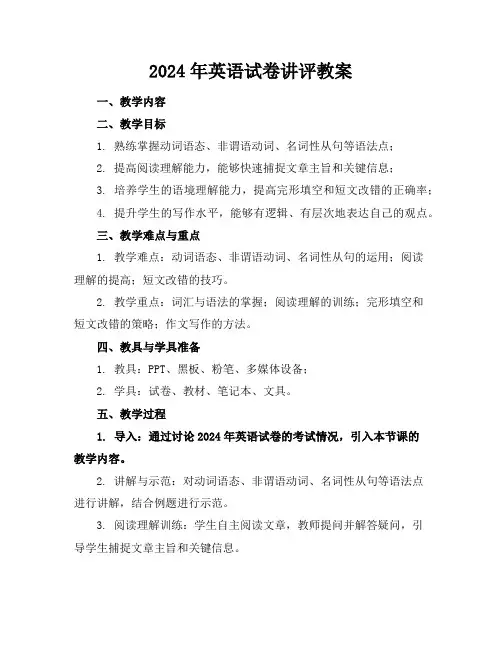
2024年英语试卷讲评教案一、教学内容二、教学目标1. 熟练掌握动词语态、非谓语动词、名词性从句等语法点;2. 提高阅读理解能力,能够快速捕捉文章主旨和关键信息;3. 培养学生的语境理解能力,提高完形填空和短文改错的正确率;4. 提升学生的写作水平,能够有逻辑、有层次地表达自己的观点。
三、教学难点与重点1. 教学难点:动词语态、非谓语动词、名词性从句的运用;阅读理解的提高;短文改错的技巧。
2. 教学重点:词汇与语法的掌握;阅读理解的训练;完形填空和短文改错的策略;作文写作的方法。
四、教具与学具准备1. 教具:PPT、黑板、粉笔、多媒体设备;2. 学具:试卷、教材、笔记本、文具。
五、教学过程1. 导入:通过讨论2024年英语试卷的考试情况,引入本节课的教学内容。
2. 讲解与示范:对动词语态、非谓语动词、名词性从句等语法点进行讲解,结合例题进行示范。
3. 阅读理解训练:学生自主阅读文章,教师提问并解答疑问,引导学生捕捉文章主旨和关键信息。
4. 完形填空与短文改错:学生独立完成练习,教师讲解解题策略,分析常见错误。
5. 作文指导:教师给出话题,指导学生进行构思,并进行写作训练。
6. 随堂练习:针对本节课的教学内容,设计练习题,让学生进行巩固。
六、板书设计1. 动词语态、非谓语动词、名词性从句的语法点;2. 阅读理解的技巧;3. 完形填空和短文改错的策略;4. 作文写作的方法。
七、作业设计1. 作业题目:(1)完成试卷中的词汇与语法练习;(2)阅读文章并回答问题;(3)完成一篇短文改错;八、课后反思及拓展延伸1. 反思:教师针对本节课的教学效果进行反思,调整教学方法,以提高教学效果。
2. 拓展延伸:推荐相关学习资料,鼓励学生进行课外学习,提高英语水平。
重点和难点解析1. 教学难点与重点的确定;2. 教学过程中的讲解与示范、阅读理解训练、完形填空与短文改错、作文指导;3. 板书设计;4. 作业设计。
一、教学难点与重点1. 教学难点与重点的确定应依据学生的实际情况和历年考试情况进行分析,确保教学内容的针对性和实用性。
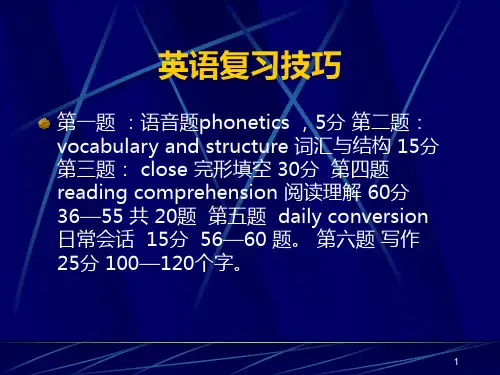
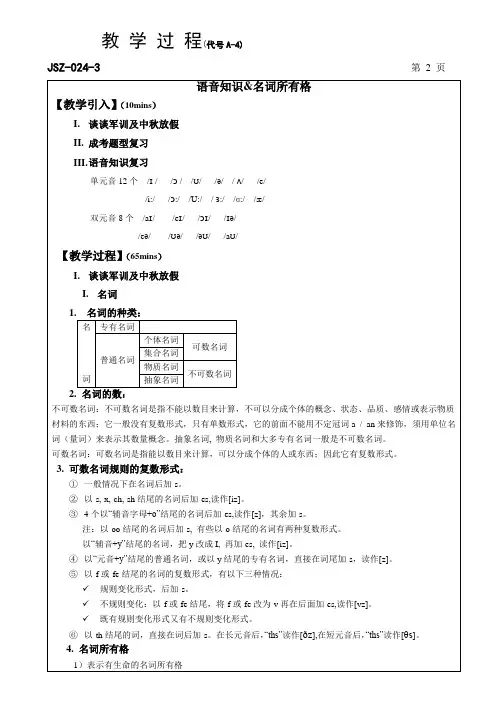
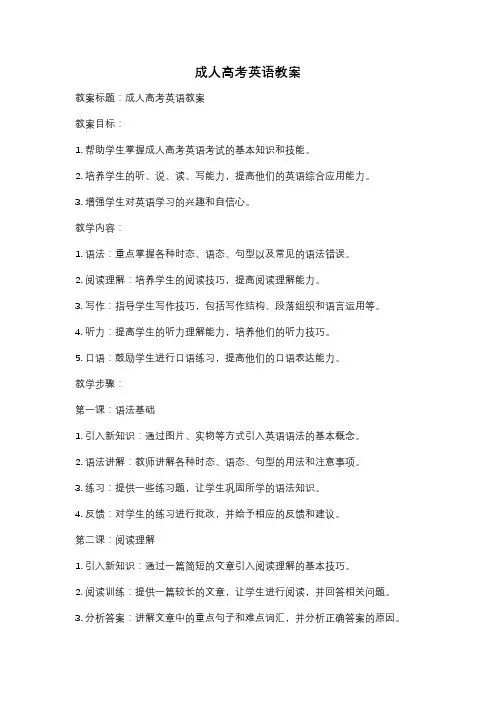
成人高考英语教案教案标题:成人高考英语教案教案目标:1. 帮助学生掌握成人高考英语考试的基本知识和技能。
2. 培养学生的听、说、读、写能力,提高他们的英语综合应用能力。
3. 增强学生对英语学习的兴趣和自信心。
教学内容:1. 语法:重点掌握各种时态、语态、句型以及常见的语法错误。
2. 阅读理解:培养学生的阅读技巧,提高阅读理解能力。
3. 写作:指导学生写作技巧,包括写作结构、段落组织和语言运用等。
4. 听力:提高学生的听力理解能力,培养他们的听力技巧。
5. 口语:鼓励学生进行口语练习,提高他们的口语表达能力。
教学步骤:第一课:语法基础1. 引入新知识:通过图片、实物等方式引入英语语法的基本概念。
2. 语法讲解:教师讲解各种时态、语态、句型的用法和注意事项。
3. 练习:提供一些练习题,让学生巩固所学的语法知识。
4. 反馈:对学生的练习进行批改,并给予相应的反馈和建议。
第二课:阅读理解1. 引入新知识:通过一篇简短的文章引入阅读理解的基本技巧。
2. 阅读训练:提供一篇较长的文章,让学生进行阅读,并回答相关问题。
3. 分析答案:讲解文章中的重点句子和难点词汇,并分析正确答案的原因。
4. 练习:提供一些类似的阅读材料,让学生进行自主阅读和练习。
第三课:写作技巧1. 引入新知识:通过展示一篇范文引入写作技巧的基本要点。
2. 写作训练:给学生提供一个写作话题,让他们进行写作练习。
3. 互评:学生之间互相交换作文,进行评价和改进。
4. 指导修改:教师指导学生修改作文,帮助他们提高写作水平。
第四课:听力训练1. 引入新知识:通过播放一段简短的英语对话引入听力训练的基本技巧。
2. 听力训练:提供一些听力材料,让学生进行听力练习,并回答相关问题。
3. 分析答案:讲解听力材料中的重点句子和难点词汇,并分析正确答案的原因。
4. 练习:提供一些类似的听力材料,让学生进行自主听力练习。
第五课:口语练习1. 引入新知识:通过展示一段英语对话引入口语练习的基本要点。
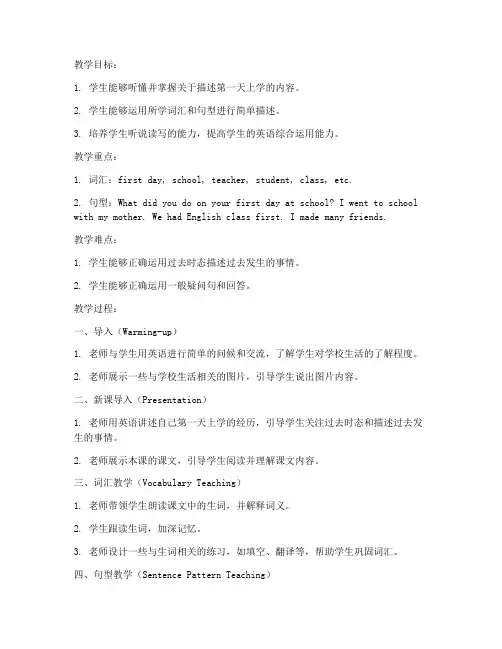
教学目标:1. 学生能够听懂并掌握关于描述第一天上学的内容。
2. 学生能够运用所学词汇和句型进行简单描述。
3. 培养学生听说读写的能力,提高学生的英语综合运用能力。
教学重点:1. 词汇:first day, school, teacher, student, class, etc.2. 句型:What did you do on your first day at school? I went to school with my mother. We had English class first. I made many friends.教学难点:1. 学生能够正确运用过去时态描述过去发生的事情。
2. 学生能够正确运用一般疑问句和回答。
教学过程:一、导入(Warming-up)1. 老师与学生用英语进行简单的问候和交流,了解学生对学校生活的了解程度。
2. 老师展示一些与学校生活相关的图片,引导学生说出图片内容。
二、新课导入(Presentation)1. 老师用英语讲述自己第一天上学的经历,引导学生关注过去时态和描述过去发生的事情。
2. 老师展示本课的课文,引导学生阅读并理解课文内容。
三、词汇教学(Vocabulary Teaching)1. 老师带领学生朗读课文中的生词,并解释词义。
2. 学生跟读生词,加深记忆。
3. 老师设计一些与生词相关的练习,如填空、翻译等,帮助学生巩固词汇。
四、句型教学(Sentence Pattern Teaching)1. 老师讲解本课的重点句型,并示范如何运用句型。
2. 学生跟读句型,并尝试运用句型进行描述。
3. 老师设计一些与句型相关的练习,如问答、角色扮演等,帮助学生掌握句型。
五、语法教学(Grammar Teaching)1. 老师讲解过去时态的构成和用法,并举例说明。
2. 学生练习使用过去时态描述过去发生的事情。
3. 老师设计一些与语法相关的练习,如改写句子、完成句子等,帮助学生掌握语法知识。

成考英语教案教案标题:成考英语教案教学目标:1. 了解成考英语考试的要求和考试大纲2. 提高学生的英语听、说、读、写能力3. 帮助学生掌握成考英语考试的解题技巧和答题技巧教学内容:1. 成考英语考试大纲和要求2. 听力训练3. 口语表达4. 阅读理解5. 写作技巧教学步骤:1. 导入:介绍成考英语考试的重要性和要求,激发学生学习英语的兴趣和动力。
2. 听力训练:播放录音,让学生进行听力练习,然后进行听力理解和答题训练。
3. 口语表达:进行口语练习,让学生进行英语对话或演讲练习,提高他们的口语表达能力。
4. 阅读理解:让学生阅读一些英语文章或短文,然后进行理解和答题训练。
5. 写作技巧:教授学生一些写作技巧,如写作结构、句型、词汇搭配等,然后进行写作训练。
6. 总结:对本节课学习内容进行总结,强调学生需要在日常学习中多加练习,掌握英语的基本技能。
教学方法:1. 听力训练采用听力练习和听力理解相结合的方式,让学生在实践中提高听力能力。
2. 口语表达采用小组讨论和角色扮演的方式,让学生在语境中进行口语表达练习。
3. 阅读理解采用多种题型的阅读材料,让学生在不同题型的训练中提高阅读理解能力。
4. 写作技巧采用示范和指导相结合的方式,让学生在实践中掌握写作技巧。
教学评估:1. 听力训练评估学生的听力理解能力和答题能力。
2. 口语表达评估学生的口语表达能力和语言表达能力。
3. 阅读理解评估学生的阅读理解能力和答题能力。
4. 写作技巧评估学生的写作能力和语言表达能力。
教学反馈:1. 针对学生在听力、口语、阅读和写作方面的表现,及时给予反馈和指导。
2. 鼓励学生在日常学习中多加练习,提高英语能力。
以上是一份针对成考英语的教案建议,希望对你有所帮助,如果有其他需要,可以随时联系我。
课时:2课时教学目标:1. 帮助学生梳理考试中的错误,分析错误原因,提高学生的英语应试能力。
2. 引导学生总结考试技巧,增强学生对英语学习的信心。
3. 培养学生良好的英语学习习惯,提高学生的英语综合素质。
教学重点:1. 分析考试中常见的错误类型及原因。
2. 总结考试技巧,提高学生的应试能力。
3. 培养学生的英语学习兴趣和自主学习能力。
教学难点:1. 引导学生分析错误原因,提高学生的英语学习能力。
2. 培养学生的英语学习习惯,提高学生的英语综合素质。
教学过程:第一课时一、导入1. 复习考试内容,回顾考试重点。
2. 引导学生思考:在考试中遇到哪些困难?有哪些错误?二、分析错误1. 分析试卷中常见的错误类型,如语法错误、词汇错误、阅读理解错误等。
2. 结合具体题目,引导学生分析错误原因,如基础知识不牢固、阅读理解能力不足等。
三、总结考试技巧1. 介绍阅读理解技巧,如快速浏览、查找关键词、归纳大意等。
2. 讲解听力技巧,如预读题目、抓住关键词、注意语调等。
3. 分析写作技巧,如合理安排段落、使用恰当的句型等。
四、课堂练习1. 学生根据所学技巧,自行练习考试题型。
2. 教师选取典型题目进行讲解,帮助学生巩固所学知识。
第二课时一、复习上节课内容1. 回顾考试技巧,引导学生复习所学知识。
2. 提醒学生注意英语学习习惯的培养。
二、讲解典型题目1. 选择具有代表性的题目,讲解解题思路和技巧。
2. 引导学生分析错误原因,提高学生的英语学习能力。
三、课堂练习1. 学生根据所学技巧,自行练习考试题型。
2. 教师选取典型题目进行讲解,帮助学生巩固所学知识。
四、总结与反思1. 引导学生总结考试中的收获与不足。
2. 鼓励学生制定学习计划,提高英语学习效果。
教学评价:1. 通过课堂练习和课后作业,了解学生对所学知识的掌握程度。
2. 关注学生的英语学习兴趣和自主学习能力,评价学生的英语综合素质。
教学反思:1. 教师在讲解过程中,注重引导学生分析错误原因,提高学生的英语学习能力。
英语试题练习题教案学案课件吉林省成人本科学士学位英语统考试题2010.11.06Part I Reading Comprehension (30%Directions: There are three passages in this part. Each passage is followed by some questions or unfinished statements. For each of them there are four choices marked A, B, C and D. You should decide on the best choice and blacken the corresponding letter on the Answer Sheet.Passage 1Questions 1 to 5 are based on the following passage:Archaeology, like many academic words, comes from Greek and means, more or less, “ the study of old things ” . So, it is really a part of the study of history. However, most historians use paper evidence, such as letters, paintings and photographs , but archaeologists (考古学家 learn from the objects left behind by the humans of long ago. Normally, these are the hard materials that don't break down or disappear very quickly —things like human bones and objects made from stone and metal.It is very unusual to find anything more than the hard evidence ofhistory--normally, the bacteria (细菌 in the air eat away at soft materials, like bodies, clothes and things made of wood. Occasionally, things are different. In 1984, two men made an amazing discovery while working in a bog called Lindow Moss, in the north of England. A bog is a very wet area of earth, with a lot of plants growing in it. It can be like a very big and very thick vegetable soup — walk in the wrong place and you can sink and disappear forever. The men were working when one of them saw something sticking out— a human foot! Naturally, the men called the police , who then found the rest of the body. Was it a case of murder? Possibly--but it was a death nearly two thousand years old. The two men had found a body from the time of the Roman invasion of Britain. Despitebeing so old, this body had skin, muscles, hair and internal organs — the scientists who examined him were able to look inside the man's stomach and find the food that he had eaten for his last meal! Why was this man so well preserved? (76 It was because he was in a very watery environment, safe fi:om the bacteria that need oxygen to live. Also, the water in the bog was very acidic. The acid preserved the man's skin in the way that animal skin is preserved for leather coats and shoes.How did he die? Understandably, archaeologists and other scientists wanted to know more about the person that they called,“ Lindow Man” . (77 His hands and fingernails suggested that he hadn't done heavy manual work in his life— he could have been a rich man. They found that he hadn't died by accident. The archaeologists believe that he was sacrificed to three different gods.1. Which language does the word “ archaeology ” come from?A. French.B. Greek.C. Roman.D. German.2. The word “ these ” in the first paragraph refers to_______.A. lettersB. photographsC. paintingsD. objects3. Which of the following helped to preserve“ Lindow Man” ?A. Ice and Iow temperature.B. Bacteria and oxygen.C. Soil and energy.D. Acid and water.4. According to the passage, which of the following statements is TRUE?A. “ Lindow Man” was named after the person who first found him.B. Historians usually use paper evidence, while archaeologists use hard evidence.C. “ Lindow Man” was found by two archaeologists in the south of England.D. “ Lindow Man” was good at manual work.5. Which is the best title for the passage?A. What Is Archaeology?B. Archaeology and HistoryC. An Amazing Archaeological DiscoveryD. The Death of“ Lindow Man”Passage 2Questions 6 to 10 are based on the following passage:The city has always been an engine of intellectual life, from the 18th-century cafes of London, where citizens gathered to discuss chemistry and politics, to the Left Bank bars of modern Paris, where Picasso talked about modem art. Without the metropolis , we might not have had the great art of Shakespeare.And yet, city life isn't easy. Now scientists have begun to examine how the city affects the brain, and the results are depressing. Just being in an urban environment, they have found, impairs (损害 our basic mental processes. (78 After spending a few minutes on a crowded city street, the brain is less able to hold things in memory, and suffers from reduced self-control. While it's long been recognized that city life is exhausting, this new research suggests that cities actually dull our thinking, sometimes dramatically so.One of the main forces at work is a complete lack of nature, which is surprisingly beneficial for the brain. Studies have demonstrated, for instance, that hospital patients recover more quickly when they can see trees from their windows, and that women living in public housing are better able to focus when their apartments overlook a lawn. Eventhese glimpses of nature improve brain performance, it seems, because they provide a mental break from the urban life.This research arrives just as humans cross an important milestone (里程碑 . For the first time in history, the majority of people live in cities. Instead of inhabiting wide-open spaces, we're crowded into concrete jungles, surrounded bytraffic and millions of Strangers. In recent years, it's become clear that such unnatural surroundings have important implications for our mental and physical health, and can powerfully alter how we think.This research is also leading some scientists to dabble (涉足 in urban design, as they look for ways to make the city less damaging to the brain. (79 The good news is that even slight alterations, such as planting more trees in the inner city or creating urban parks with a greater variety of plants, can significantly reduce the negative side effects of city life. The mind needs nature, and even a little bit can be a big help.6. Which of the following is the main idea of this passage?A. The city inspires talented people.B. The city hurts your brain.C. The city has many pleasures and benefits.D. The city seriously affects the natural balance.7. The word “ metropolis ” in the first paragraph is closest in meaning to_______. A. citizen B. nature C. city D. stress8. People have just come to realize that_______.A. human attention is a scarce resourceB. city life can make people very tiredC. the city is an engine of intellectual lifeD. an urban environment is damaging to the brain9. What is the factor mentioned in the third paragraph that helps the hospital patients recover more quickly?A. Nature.B. Better treatment.C. Experienced doctors.D. Good medicine.10. According to the passage, which of the following statements is TRUE?A. Different aspects (方面 of an urban environment, such as the crowded streets, can lead to an increase in self-control.B. Small changes in urban design, cannot reduce the negative side effects of city life.C. For the first time in history, the earth's population is more urban than rural.D. A walk down a busy city street will improve brain performance.Passage 3Questions 11 to 15 are based on the following passage:Breastfeeding (母乳喂养 for a month or longer appears to reduce a woman's risk of getting diabetes (糖病 later in life, according to a new study. The breastfeeding and diabetes link has been reported in other studies, according to researcher Eleanor Schwarz. Yet, her study makes the link easier to believe. Her study is published in a journal of medicine in America. Schwarz and her colleagues looked at data aboutbreastfeeding practices. They evaluated data on 2,233 women f~om Califomia. Of those, 405 were not mothers, 1,125 were mothers who breastfed for at least a month, and 703 were mothers who had never breastfed. They were 40 to 78 years old.According to Schwarz's study, the risk of getting a diagnosis (诊断 of Type 2 diabetes for women who breastfed all their children for a month or longer was similar to that of women who had not given birth. But mothers who had never breastfed were nearly twice as likely to develop diabetes as women who had never given birth. Mothers who never breastfed were about 1.4 times as likely to develop diabetes as women who breastfed for one to three months, Schwarz found.While one month of breastfeeding appears to make a difference, Schwarz says, even longer is better. (80 “ Previous studies have shown the longer the mom breastfeeds, the more benefit for her body. ” Many experts recommend breastfeeding for six months and continuing for a year, she says.The diabetes-breastfeeding link is probably explained by belly fat. Mothers, who don't breastfeed, as they get older, may have more belly fat, as breastfeeding helps new mothers take off weight. “ Belly fat increases the risk of diabetes as you get older,” she says.The finding isn't surprising at all, says Kimberly Gregory. She often gives advice to women who get diabetes (occurring during pregnancy (怀孕 that they are at risk for later getting Type 2 diabetes and suggests they breastfeed. The new findings will probably inspire Gregory to add to the-advice she gives moms-to-be about the benefits of breastfeeding. She often focuses on the benefits to the baby. 11. According to the first paragraph, which of the following statements is TRUE?A. About two thousand and two hundred old women took part in the study.B. Eleanor Schwarz's research program was about men and women who suffered from diabetes.C. Over one fifths of the women never got married.D. Eleanor Schwarz's results seem more reliable.12. According to Schwarz's findings, who are more likely to get diabetes later in life?A. Those mothers who had never breastfed.B. Those mothers who never gave birth.C. Those mothers who breastfed for a month.D. Those mothers who breastfed for six months.13. Which of the following statements would Schwarz agree with?A. Breastfeeding is not advisable because it is not good for a mom to keep a good shape.B. Breastfeeding can greatly reduce a mother's chances of getting all kinds of serious disease.C. Breastfeeding for a month is highly recommended: the longer, the better.D. Breastfeeding for a month or longer makes babies smarter.14. What does the author mean by “ moms-to-be ” in the last paragraph?A. Women who are pregnant, especially for the first time.B. Women who dream of having babiesfor the first time.C. Women who already have children.D. Women who have just got babies for the first time.15. Which of the following is an appropriate title for this passage?A. Breasffeeding May Enhance Babies' Chances of SurvivalB. Breasffeeding May Lower Moms' Diabetes RiskC. Breasffeeding May Become Very Fashioaable in Near FutureD. Breasffeeding May Help Women Lose WeightPart Ⅱ Vocabulary and Structure (30%Directions: In this part there are 30 incomplete sentences. For each sentence there are four choices marked A, B, C and D. Choose the ONE answer that best completes the sentence. Then blacken the Corresponding letter on the Answer Sheet.16. You should carefully think over_____ the manager said at the meeting.A. thatB. whichC. whatD. whose17. Last week I wrote to the hotel to book a room, but they _____ yet.A. didn't answerB. wasn't answeringC. hadn't answeredD. haven't answered18. Diana felt very much upset at _____ to the party as she had longed to go for a long time.A. having not been invitedB. not having been invitedC. not to be invitedD. to be not invited19. On no account _____ held responsible for the car accident, so he should not be put into prison.A. the driver can beB. can the driver beC. the driver beD. be the driver20. All the kids are crying now. What_____makes them so unhappy?A. it isB. is itC. it is thatD. is it that21. Unfortunately, the package I was expecting was _____ to the wrong address. A. written B. given C. packed D. delivered22. _____by a large audience, he felt very nervous and didn't know what to say. A. Watching B. Watch C. Watched D. Having watched23. I'm very grateful for your help and hope to do something for you_____in the future.A. in exchangeB. insteadC. in returnD. in particular24. I can ____you that the animals are well cared for in our zoo, so you needn't worry about them.A. supposeB. assumeC. assureD. grant25. The drowning boy made a _____ attempt to catch the rope thrown to him. A. dangerous B. graceful C. gentle D. desperate26. If we_____early tomorrow morning, we will reach the coast before dark. A. take off B. set off C. set up D. take up27. A lot of people mistake John for Bill because they _____ each other in appearance too much!A. weaveB. utilizeC. revealD. resemble28. When there are cordial relations between the two countries, we mean there exists a_____ relationship between them.A. friendlyB. hostileC. fertileD. complicated29. The patient's recovery was very encouraging as he could_____get out of bed without help.A. onlyB. almostC. me'relyD. hardly30. At the job interview, Mr. Brown gave a good _____ of himself and finally got a job as a salesman.A. opinionB. ideaC. cryD. account31. As is well known, eating too much fat can_____heart disease and cause high blood pressure.A. add toB. attend toC. contribute toD. apply to32. A club is a place to make frequent_____with friends.A. accountsB. attemptsC. contentsD. contacts33. _____the obvious differences in size and population, the states of America have many things_____ common.A. Although; onB. Though; inC. Despite; inD. Because of; on34. Scientists say it may be five or six years _____this medicine is tested on human beings.A. sinceB. beforeC. afterD. when35. With larger numbers of graduates than ever before, just having a degree will no longer be enough to make you _____in the crowd.A. stand upB. stand byC. stand forD. stand out36. The doctor tried to do an experiment to find out the_____of the medicine on the mice.A. causeB. resultC. reasonD. effect37. This is only one of the laundries in the district modem equipment. A. that have B. which have C. that has D. what has38. Skating can be good for you _____ correctly.A. though doingB. though doneC. if doneD. if doing39. By the end of last week 611 people from 49 countries to attend the meeting, with nearly half coming from the United States, Germany and Britain.A. had registeredB. have registeredC. registeredD. were registered40. It was suggested that____big event like the Year of Russia in China should certainly benefit_____relationship between the two countries.A. a; theB. the; aC. a; /D. the; /41. Although he knew little about the large amount of work done in the field, he succeeded_____ other more well-informed experimenters failed.A. asB. unlessC. whatD. where42. Having been praised by the teacher, the little girl ran back home, _____. A. happily and satisfied B. eager and excitedlyC. happy and satisfiedD. anxiously and excitedly43.— How are their talks going on? Have they reached any agreement?— They only seemed to have agreed to set another date for __ talks.A. deeperB. slowerC. furtherD. higher44. _____ ten minutes earlier, you wouldn't have missed the train.But you were late.A. Had you comeB. Did you comeC. Have you comeD. Should you come45. Having been told that her son died in the accident, the old womanappeared very calm, as if nothing _____.A. happenedB. were happenedC. was happenedD. had happenedPart III Identification (10%Directions: Each of the following sentences has four underlined parts marked A, B, C and D. Identify the one that is not correct. Then blacken the corresponding letter on the Answer Sheet.46. I don't think a warm winter always has a negative influence on our life, hasn't it?A B C D47. We have been told that under no circumstances we may use the telephone in the office for personal affairs.A B C D48. A warm thought suddenly came to me which I might use the pocket money to buy some flowers for my mother's birthday.A B C D49. To wait in the queue for half an hour, the old man suddenly realized that he had left the wallet in the car.A B C D50. The Great Wall is So a well-known tourist attraction that millions of people pour in every year.A B C D51. Equipped with modem facilities, today's hospitals are quite different from that of the past.A B C D52. We solved the problem by using a computer rather than to do it all by hand. A BC D53. Who has eyes can see what great achievements we have made since 1978. A B C D54. Surely, there are lots of problems solving in our research so we need to get well prepared in advance.A B C D 55. The harder he tried, the most failures he suffered in his early days as a writer A B C DPart IV Cloze (10%Directions: There are 20 blanks in the following passage, and for each blank there are 4 choices marked A, B, C and D at the end of the passage. You should choose ONE answer that best fits into the passage. Then blacken the corresponding letter on the Answer Sheet.We have quite a bit of information about ancient Egyptian medicine. Doctors' instructions have been found to tell us 56 they did for the sick and the injured. 57 many of the treatments included magic, ancient Egyptians used plant leaves and other methods to treat many 58 .Religion, magic and medicine were 59 related in ancient Egypt. Some priests (牧师were specially 60 as doctors to 61 the sick and the injured. Doctors were held to a high moral standard. Patients was treated with 62 andtheir 63 information was highly secret. The highest-ranking doctors were priests of the goddess Sekhmet, 64 controlled illnesses. Doctors spent a part of each year 65 the goddess. Doctors were thought to be 66 to the gods and able to ask them for healing.Temples were centers for healing. 67 a person was ill, he or she would come to the temple or 68 a doctor for a diagnosis (诊断 . A(n 69 problem was treated with medicine, prayer and magic. If a clear cause was not 70 , the diagnosis would be that the illness was caused by an evil spirit or cUrse. The doctor would use magic spells to 71 a cure. 72 , a diagnosis could not be reached. 73 this case, a patient would be told to rest for a period of time 74 another examination could be 75.56. A. what B. why C. that D. which57. A. When B. Since C. Although D. After58. A. damages B. diseases C. disasters D. destructions59. A. hardly B. closely C. mainly D. shortly60. A. trained B. designed C. planned D. studied61. A. look to B. come to C. care for D. search for62. A. reputation B. inspection C. fame D. respect63. A. ill B. own C. hidden D. personal64. A. that B. which C. who D. what65. A. serving B. reading C. learning D. following66. A. careful B. generous C. mean D. close67. A. Before B. When C. Until D. Since68. A. think over B. apply to C. call for D. make up69. A. serious B. internal C. odd D. obvious70. A. treated B. discovered C. cured D. aroused71. A. bring about B. set out C. insist on D. make up72. A. Subsequently B. Consequently C. Occasionally D. Hopefully73. A. With B. In C. For D. On74. A. until B. when C. although D. because75. A. decided B. performed C. carried D. discussedPart V Translation (20%Section ADirections: In this part there are five sentences which you should translate into Chinese. These sentences are all taken from the 3 passages you have just read in Reading Comprehension. You can refer back to the passages to identify their meanings in the context.76. It was because he was in a very watery environment, safe fi.om the bacteria that need oxygen to live.77. His hands and fingernails suggested that he hadn't done heavy manual work in his life— he could have been a rich man.78. After spending a few minutes on a crowded city street, the brain is less able to hold things in memory, and suffers from reduced self-control.79. The good news is that even slight alterations, such as planting more trees in the inner city or creating urban parks with a greater variety of plants, can significantly reduce the negative side effects of city life.80. Previous studies have shown the longer the mom breastfeeds, the more benefit for her body.SectionBDirections :In this part there are five sentences in Chinese . You should translate them into English. Be sure to write clearly.81.在房子前面的大树下放着一张桌子。
成考英语试卷讲课教案2016-2017学年第2学期期末试卷A卷科目:成考英语适用专业班级:所有成考班级闭卷考试时间:100 分钟满分:100分专业班级姓名学号1.请首先在试卷要求处写上学生姓名、学号和班级。
2.请仔细阅读各种题目回答问题,在规定的位置填写答案。
3.考试开始30分钟后方可交试卷。
1. ____broke down again but luckily they knew how to fix it.A. Tom’s and Al’s carB. Tom and Al’s carsC. Tom’s and Al’s carsD. Tom and Al’s car2. You must be more Jim. Look, you didn’t write ____.A. f carefully, carefulB. careful, carefullyC. carefully , carefullyD. careful, careful3. Would you like ____sweets?A. someB. anyC. muchD. a4. I often heard him____ that his family was well descended.A. saidB. sayC. to sayD. says5. She was ill that day. Otherwise she ____ part in the parade.A. would takeB. would have takenC. tookD. had taken6. All he needs to do ____ the form.A. fill inB. fills inC. are to fill inD. is to fill in7. There is a bridge ______ the river.A. onB. overC. acrossD. at8. It______ for two days and the fields are all under water.A. rainedB. has been rainingC. was rainingD. is raining9. Written in great haste,______ .A. Jim made a lot of mistakes in the reportB. there are plenty of errors in the reportC. we found several mistakes in his reportD. the book is full of errors10. I have never taken anything______ didn’t belong to me.A. whatB. whoC. thatD. which11. The children ______ against each other to win yearly scholarship.A. contestB. fightC. completeD. compete12. Her shoes are similar to _______ you had on yesterday.A. the oneB. the one whichC. the ones whatD. the ones13. He doesn’t dare to leave the house in case he _______.A. is recognizedB. will be recognizedC. will recognizeD. has been recognized14. You like it, _______?A. don’t youB. didn’t youC. hasn’t youD. aren’t you15. I made up my mind that under no circumstances _______ to such a principle.A. couldn’t I agr eeB.I couldn’t agreeC.I could agreeD. could I agree16. She played _____ in the orchestra.A. a violinB. violinC. violinsD. the violin17. Go along the street, _____ you’ll find the university..A. soB. orC. andD. but18. The girl _____ work won the prize is the youngest in her class.A. whoB. whoseC. thatD. for whom19. It is proved that this substance reacts ______ as fast as the other one.A. one-tenthB. first-tenC. one-tenD. one-tenths20. Poor Jack. He _________ for 3 years.A. has been dying B has been dead C. has died D. died三. 完型填空。
成考高升专英语教案•Step 1 : 1. 介绍考试大纲. 2. 应考方法概述•Step 2 : 教案目录•第一部分:语音•第二部分:词法•第三部分:句法•第四部分: 词组与句型•第五部分: 完形填空•第六部分: 阅读理解•第七部分: 补全对话•第八部分: 书面表达•Step 3 第一部分:语音• 1. 讲解 P.1-6教材• 2. 归纳历年常考点如下:a, b, c, o, u, s, g, ai, ea, ex,ou, ch, th, ear, our •如:1. a (1). baggage, attack• (2). average, attract• 2. b (1). comb, doubt, climb, describe• 3. c (1). circle, coast (2). lecture, escape• 4. o (1). clock (2). comb, smoke• (3). prove (4). provide• 5. u (1). drug (2). Duty• (3). cushion, bush• 6. s (1). respect (2). disease•7. g (1). goat (2). gentle•8. ai (1). Remain (2). bargain•9. ea (1). measure (2). league,treat•10. ex (1). explain, excuse (2). extra•11. ou (1). found (2). shoulder (3). cousin•12. ch (1). chicken (2). chemistry•13. th (1). therefore, with• (2). through,healthy•14. ear (1). fear (2). heard•15. our (1). hour (2). four• 3. 讲述如何应考• 4. 挑选P.7-9的一些练习进行讲解•(1). 动词后面加-ed,-ed的发音规则•(详细规则见教材P16-17):•①、/t/、/d/后的-ed,读/id/。
2016-2017学年第2学期期末试卷A卷科目:成考英语适用专业班级:所有成考班级闭卷考试时间:100 分钟满分:100分专业班级姓名学号1.请首先在试卷要求处写上学生姓名、学号和班级。
2.请仔细阅读各种题目回答问题,在规定的位置填写答案。
3.考试开始30分钟后方可交试卷。
1. ____broke down again but luckily they knew how to fix it.A. Tom’s and Al’s carB. Tom and Al’s carsC. Tom’s and Al’s carsD. Tom and Al’s car2. You must be more Jim. Look, you didn’t write ____.A. f carefully, carefulB. careful, carefullyC. carefully , carefullyD. careful, careful3. Would you like ____sweets?A. someB. anyC. muchD. a4. I often heard him____ that his family was well descended.A. saidB. sayC. to sayD. says5. She was ill that day. Otherwise she ____ part in the parade.A. would takeB. would have takenC. tookD. had taken6. All he needs to do ____ the form.A. fill inB. fills inC. are to fill inD. is to fill in7. There is a bridge ______ the river.A. onB. overC. acrossD. at8. It______ for two days and the fields are all under water.A. rainedB. has been rainingC. was rainingD. is raining9. Written in great haste,______ .A. Jim made a lot of mistakes in the reportB. there are plenty of errors in the reportC. we found several mistakes in his reportD. the book is full of errors10. I have never taken anything______ didn’t belong to me.A. whatB. whoC. thatD. which11. The children ______ against each other to win yearly scholarship.A. contestB. fightC. completeD. compete12. Her shoes are similar to _______ you had on yesterday.A. the oneB. the one whichC. the ones whatD. the ones13. He doesn’t dare to leave the house in case he _______.A. is recognizedB. will be recognizedC. will recognizeD. has been recognized14. You like it, _______?A. don’t youB. didn’t youC. hasn’t youD. aren’t you15. I made up my mind that under no circumstances _______ to such a principle.A. couldn’t I agr eeB.I couldn’t agreeC.I could agreeD. could I agree16. She played _____ in the orchestra.A. a violinB. violinC. violinsD. the violin17. Go along the street, _____ you’ll find the university..A. soB. orC. andD. but18. The girl _____ work won the prize is the youngest in her class.A. whoB. whoseC. thatD. for whom19. It is proved that this substance reacts ______ as fast as the other one.A. one-tenthB. first-tenC. one-tenD. one-tenths20. Poor Jack. He _________ for 3 years.A. has been dying B has been dead C. has died D. died三. 完型填空。
(20分)It is very important to stay healthy. I have a neighbor. She is an old lady. She can do all the housework, 1 newspapers, watch TV and search on the Internet to learn something new. I often see 2 do taijiquan in the morning and dance in the evening. She looks young and beautiful 3 she is over seventy. Last week a reporter from a magazine interviewed her and asked 4 she kept so young and healthy. She replied with a smile:I have a secret of staying young and healthy. It is quite 5 . Keep your mind active, take an interest in the world 6 you, and learn at least one new thing every day. Try to do different kinds of housework and do sports as 7 as you can. Don’t think you are too old to go back to 8 . I know a man who entered a medical college when he was 70 years old. He studied there for 6 years and now he is a doctor. Another man went to a tennis school at the age of 71 and now he is good at 9 tennis. Some people may say staying young is easy only for those who live in the future. In fact, no matter how old you are, you can make it.Please tell the story to your family. It would be a good start to 10 the lady’s example. I hope all people will stay young and healthy.1. A. look B. read C. see D. watch2. A. her B. him C. other D. others3. A. than B. since C. though D. because4. A. what B. why C. who D. how5. A. early B. dear C. easy D. late6. A. under B. around C. above D. between7. A. soon B. busily C. hardly D. often8. A. place B. song C. school D. dance9. A. buying B. losing C. sending D. playing10. A. follow B. give C. make D. bring四.阅读理解。
(30分)AHow do you remember the way to your house? Where do dreams come from? It is your brain that does these things. A British scientist showed that “sleep can improve one’s memory.” It’s not a dream for students to study when they sleep. In fact, your brains is working day and night. If you learn words before bed, a certain part of the brain may help you to remember the words while you sleep. What’s more, another scientist in the USA found that there was a “talent button” in the human brain. It might make a person more talented.There are more interesting things about the brain. Your brain uses less energy than a fridge light. Just twobananas can give the brain enough energy to work for a whole day. According to some scientists, yawning keeps our brains “cool”, which makes us think quicker.Here are some pieces of advice to keep a good brain:●Eat healthy foods.●Get a lot of playtime or exercise.●Don’t drink or smoke.●Use your brain a lot.1. A British scientist found out that ________ could improve our memories.A. drinkB. dreamsC. sleepD. bananas2. According to the passage, if we want to have a good brain, we should ________.A. use our brains moreB. sleep fewer hoursC. work longer hoursD. remember fewer things3. Which of the following is TRUE according to the passage?A. Our brains only work in the daytime.B. Our brains need much energy every day.C. Smoking can keep our brains healthy.D. Getting exercise is good for our brains.BDo you know that animals have love for each other and their children just like us humans? Let me tell you some moving stories of great animal parents.Several years ago a heavy rain hit a town and made the river go up. When the rain stopped, people found that a dog swam to an island in the river twice a day for two weeks. Why did she do so? Her four children were there. The mother swam there every day to feed her babies. This true story moved many people.Another story is about chimpanzees(猩猩). A scientist named Jane Goodall spent 4 years living with chimpanzees in Africa. She found that chimpanzees also cared for those that were hurt or got lost. “It is not only humans who have duties, animals also do,” she said.Two birds in Chengdu also showed their parental(父母的) love. Their baby was hurt and fell on the street in the center of the city. Cars were driving past but the brave parents rushed down to the road and took the little bird away with their claws.4. After the heavy rain, the mother dog swam to the island ________.A. to look for foodB. to feed her babiesC. to move some peopleD. to carry things to her owner5. The scientist found chimpanzees ________.A. cared for the hurt or lost onesB. often left for a far placeC. always stayed in the same placeD. didn’t care about each other6. The two birds rushed down and took the little one away because ________.A. they didn’t like their babyB. they were not kind enoughC. they wanted to teach their babyD. they wanted to save their baby7. From the passage we know ________.A. dogs like to swim across the river in a heavy rain.B. mother birds don’t want to save their childrenC. animal parents love their children a lotD. all animals want to move people very muchCBill was a boy of 15. His parents went gambling(赌博) day and night. Nobody cared about him. He always failed in his exams. So his teachers didn’t like him, nor did his classmates play with him.Bill often slept in class because his heart was not in school. He almost gave himself up.One day, Miss Jones, a new teacher, came to Bill’s class. She was a smiling, beautiful woman. Bill was in love! For the first time in his young life, he couldn’t take his eyes off his teachers; yet, still he failed.It was Miss Jones’ class. She was asking a question. “I’d like the smartest boy to answer my question.” Then she said loudly, “Bill, please!”Bill was surprised. And he stood up without a word.“Just try it! I believe you can!”After school, Miss Jones had a long talk with Bill. She told him that she cared about him and believed in him.Bill thought a lot that evening. From then on he arrived at school on time every day. Miss Jones helped him with his homework in the afternoon. She even cooked delicious food for him. She told Bill, “Nothing is impossible if you put your heart in it.”Later, Miss Jones gave another exam. Bill did it with all his heart. He was very excited to find that he had passed the exam. Now Bill discovered that not only could he learn, but he could do it well. A change took place in Bill’s heart.You see, one teacher saved one boy, it’s simple(简单的), really.8. Bill always failed in the exams at first because he ________.A. went gamblingB. talked in classC. didn’t answerD. gave himself up9. Miss Jones changed Bill by ________.A. doing homework for himB. encouraging and helping himC. giving Bill another examD. cooking delicious food for him10. From the passage we can learn ________.A. Miss Jones was a loving and careful teacherB. Bill’s parents cared about him very muchC. Miss Jones loved to answer Bill’s questionsD. Bill didn’t like to play with his classmates11. Which may be the best title for the passage?A. A Strict TeacherB. A Lazy BoyC. A Boy’s ChangeD. GamblingDOne day a very rich family went on a trip to the countryside. The father wanted to show his son how poor people lived, so they spent a day and a night on the farm of a very poor family.When they got back from their trip, the father asked his son, “My dear son, how was the trip? ” “Very good, Dad!” “Did you see how poor people lived? ”The father asked. “Yeah! ” “And what did you learn? ”The son answered, “We have a dog at home, and they have four. We have a pool that is in the middle of the garden and they have a river that has no end. We have very expensive lamps in the garden and they have the stars. ”When the little boy finished, his father was speechless.12. Where did the rich family go on a trip?A the countrysideB the big cityC the poolD the river13 .How long was the trip to the countryside?A about 12 hoursB about 24 hoursC less than 12 hoursD about 48 hours14 The father wanted to show his son .A how rich their family wasB how poor their family wasC how the poor family livedD where the poor lived15. The word speechless means .A 毫无兴趣的B 寡言少语的C 胸无点墨的D 无话可说的四、根据对话内容,选择正确的句子补全对话。